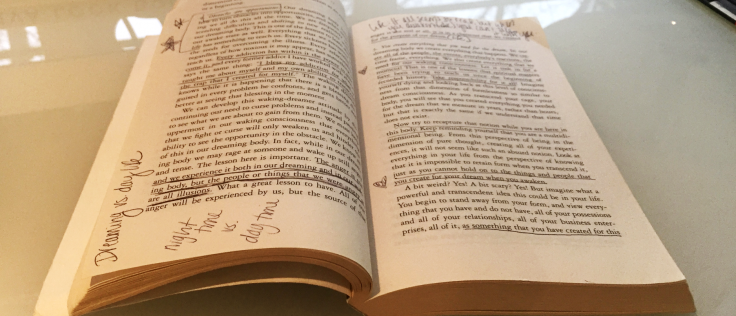I recently read a book by one of my spiritual gurus, Dr. Wayne Dyer called, You’ll See It When You Believe It. And I kid you not, my head nearly exploded when Dr. Dyer explored the fascinating, simple, and powerful dynamics of what it’s like to wake up from a dream.
Okay, so think about what happens during and after a hypothetical bad dream. Let’s say that in it, you’re being chased by someone trying to kill you. You sense the person near you, see the person chasing you, and maybe you even realize that you know this person as you scramble to get away from them as fast as you can.
During your dream, this scene feels incredibly real.
So real, in fact, that when you wake up, your heart might be racing, your palms sweating, your blood pressure booming, and you are fully freaked out. So what does Dr. Dyer have to say about waking up from such imaginary chaos? “While your fear is real,” he writes, “what’s causing the fear is actually an illusion.”
Mind. Blown.
Think about it: as you frantically experience your imaginary dream, your body reacts in a very real way. The person and scenario that got you all worked up are an illusion created in your mind. To break this down even further, Dr. Dyer explains:
- First, you fall asleep at night, and you enter an alternative reality.
- In this alternative reality, you get bothered and flustered about things that do not exist.
- When you wake up in the morning, you feel silly for reacting so strongly to the illusions in your mind.
- You shake it all off and get back to life.
What’s interesting is that Dyer insists the same sequence of events happen when you die.
One day when we leave this world (no matter what your religious beliefs are), we will enter a new world. Our physical bodies will die, but our consciousness will live on in a different, more metaphysical place.
And when we wake in this new space, we’ll look back at our physical time on earth and see the folly of holding so tightly to the illusions we created in our minds. Then, just like when we wake from a dream, we’ll shake it off and get on with our new existence.
I think Dr. Dyer is on to something here. I mean, think of how you feel when you’re lying in bed, a sweaty mess, trying to recover from the stress of battling a person or situation in a dream that wasn’t real.
Not surprisingly, you feel silly when you know that what you just experienced was a dream. But haven’t you also experienced that exact same sense of foolishness when you got all hot and bothered by something in your actual life that also didn’t happen?
It’s like when I worked myself up because I thought I was going to be late for a tennis match and didn’t end up being late at all. This kind of thing happens all the time. We get stressed about illusions in life, just like we get stressed about illusions in our dreams.
Maybe our life and dreams have more in common than we think.
If Dr. Dyer is right, one day, we will look back at our time on earth and realize that so much of our stress was caused by illusions. If this is the case, then perhaps it’s time to figure out coping mechanisms to help us get less worked-up while we’re still earthly.
Here are four helpful truths to keep in mind when dealing with illusions that stress you out:
Time does not exist. Time is meaningless in dreams. One minute you’re playing the part of a wise grandmotherly figure, and the next, a fumbling teenager. And when it comes to the lapsing of time, you can easily experience what feels like an entire lifetime during the span of ten minutes.
How can this apply to everyday life? You can reduce your preoccupation with time, aging, schedules, and hurry. When we pass on and wake up in the afterlife, our 90-year lifetime might feel like a dream that lasted 90 minutes. So, try not to stress over every minute and detail that occurs during those ninety years. We risk feeling like it was a waste of time when all is said and done.
Obstacles can be turned into opportunities. Your dreaming mind knows how to turn obstacles into opportunities. If you’re driving down the road in one of your dreams and the road suddenly stops at a cliff’s edge, you can turn the situation into an opportunity to fly rather than crash and burn. In your dreams, you’re in charge, and you can determine the outcome. The same should be true for the rest of your life. Every challenge you encounter in life has the opportunity to teach you something. The lesson here is to reduce our need to curse our problems and instead pause to see what we’re about to gain from them.
You create nearly everything around you. In dreams, your mind creates nearly everything in its midst; the people, events, and reactions that come together to form a kind of narrative. If someone sneezes on you in a dream, your mind created the person and the sneeze. In that same vein, you create nearly everything in your waking life too. Take responsibility for the people and circumstances around you. Respond as if everything that comes your way (with the exception of most illnesses and death) was placed in your life by you. If you’re struggling with an issue, ask yourself, “Did I create this in my life—and if so, why?”
Your reactions are real; everything else is an illusion. When you dream, your waking reaction to it is real but everything in the dream remains an illusion. The same is true in daily life. No one can create anger or stressful reactions within you; only you can do that. And in real time, you’re responsible for the energy you bring to a room, and how you walk through the world. Everything else is perception, and that can be an illusion.
So, there you have it. Four things your dreams can teach your living mind. By considering our dreams when we’re awake, we can see how futile it is to be upset about the illusions all around us.






